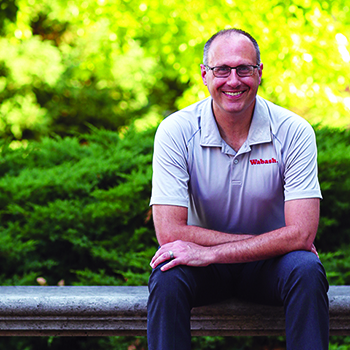Preston Bost set out to become a chemical engineer. As an undergraduate at Yale University, he struggled through two years before a psychology course on cognition changed his academic arc. Not only did it convert Bost to a psychology major, but he has taught the course every year since he’s been in the classroom.
“I don’t get tired of it,” Bost says. “It has important things to say about how the mind works, and also how what we know about how the mind works is relevant to how the mind works.”
In April, Bost was named the 2023 recipient of the McLain-McTurnan-Arnold Excellence in Teaching Award at the College’s annual Awards Chapel. The award honors the memories of Reid H. McLain W1927, Clair McTurnan W1910, and Kent Arnold ’29, and has been given annually since 1965 to a member of the faculty who has distinguished him or herself by innovative and engaging teaching.

Bost’s ultimate reaction to the announcement was gratitude.
“I’m grateful to have arrived at this point in my career knowing a bit more about teaching than I did 23 years ago and grateful that I was at a place that nurtured that development,” he says. “This is a place where, if you’re paying any attention at all, you can’t help but grow with the colleagues you serve with and with the students you serve.
“Twenty years ago for me, a good day was, did I craft this beautiful, glistening lecture?” Bost continues. “But to me, a good day teaching now is, did we jump into the messiness of the important stuff? And did my students maybe see something they hadn’t seen before?”
This past semester, Bost partnered with the Frederick Douglass Project for Justice to provide his students with a virtual visit inside a correctional facility in Colorado. As part of his Psychology and the Law course, his goal was for students and inmates to get to know each other and recognize real people behind the labels.
“I got into it through cognition, which tells us how memory works, which turns out to be very different from how juries, judges, and lawyers think memory works,” Bost says. “It doesn’t work like a videotape that we simply replay. Rather, we mentally re-create the past at the time of remembering. Historically accurate bits combine with pieces from other sources, such as other events, inference, or even suggestion. So, memory is a storyteller, rather than a file clerk.
“Criminal convictions all too often rely on eyewitness memory as a historical record, but memory was simply not evolutionarily designed to do what the legal system demands of it. Hence the consistent finding that mistaken eyewitness identification is by far the most common contributing factor in false convictions. I quickly realized that’s not the only issue where psychology has something to say about criminal procedure.
“We say inmate or criminal, and that conjures up all manner of stereotypes,” he says. “But in fact, this is a person who’s living an experience that we need to know more about.”
He describes the experience as one of the most powerful things he has done as an instructor, and adds, “I hope it was the same for my students.”